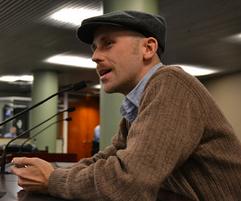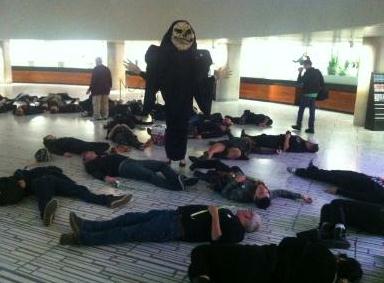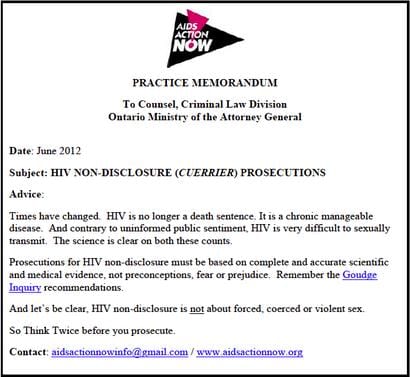
Jordan Bond-Garr, of AIDS Action Now, deputing at budget committee at city hall in September. Credit: Andrea Houston (file photo)

The AIDS Action Now die-in at city hall on Sept 23, 2011. Credit: Andrea Houston (file photo)
Ahead of Toronto Pride Week, AIDS Action Now (AAN) is calling on Crown prosecutors to think twice before proceeding with HIV-nondisclosure criminal cases.
In a half-page ad in this week’s edition of the Ontario Reports, a weekly publication sent to Ontario lawyers, the group urges prosecutors to give the issue more thought, noting, “Prosecutions for HIV non-disclosure must be based on complete and accurate scientific and medical evidence, not preconceptions, fear or prejudice.”
The $1,500 ad was paid for by an anonymous donor, says AAN’s Glenn Betteridge. Ontario Reports includes important cases, announcements and practice directions to lawyers from courts and ministries.
In a separate press statement, AAN states that Crown prosecutors play a pivotal role in the criminal justice system, deciding whether or not to proceed with criminal charges.
“AIDS Action Now is challenging Crown Prosecutors and the legal community to change the way they think about HIV non-disclosure cases,” the release states. “Our ultimate goal is to reduce the number of HIV non-disclosure criminal prosecutions as a way to promote the health and rights of people living with HIV.”
The ad is one of several actions planned by queer groups this Pride season. Activists hope to keep the focus on a number of issues affecting queer Canadians, including Bill C-31, which would reform federal refugee laws; sex worker rights; attacks on queer and trans people; bullying; safe and affordable housing; and trans rights. But as always, HIV criminalization remains a top priority, says AAN’s Jordan Bond-Gorr.
“There’s enough that we can say, ‘Queers are still dying. Queer lives are still impacted by our government, by corporations, by society,’” he says. “So this year we felt we wanted to bring attention to a number of different issues throughout the course of the week.”
Bond-Gorr says Queers for Social Justice, a coalition of several local activist groups, is planning three die-in demonstrations during Pride Week. The first will be at the flag-raising ceremony, Pride’s official kickoff at Toronto City Hall, on June 25 at 11:30am.
“The die-in at city hall has a lot of symbolism,” Bond-Gorr says. “We have a mayor that has had a very contentious relationship with the queer community. The budget cuts, which we fought hard against this year, are an example of austerity measures that governments are pushing which have negative impacts on queers.”
Queers for Social Justice are also the organizers of the upcoming night march, on June 25 at 8:30pm, at Nathan Phillips Square.
The second die-in is planned for June 28 at 6pm at the corner of Church and Wellesley streets. Queers for Social Justice hopes the streets will be filled with Pride party revellers who will take a moment to stop and watch.
“People are out on the street, having a beer. The goal is not to bring the message in a heavy-handed way,” Bond-Gorr says. “We want to have some fun and theatricality with it.”
The third will take place during the Dyke March on June 30. The Dyke March is traditionally very political, with people making statements on many of the same issues, Bond-Gorr says.
“We will have a contingent in the Dyke March, and the die-in will be during the march,” he says. “We want to be a theatrical presence. Pride’s theme this year is ‘celebrate and demonstrate.’ So we really highlight the demonstrate aspect.”
The official start of Pride is June 25, but the season really begins, on a serious note, with the annual AIDS Candlelight Vigil in Cawthra Park, behind the 519 Community Centre, June 21 at 9pm. This year, Angela Robertson, from Black CAP, and Mark Fisher, from the Ontario HIV Treatment Network, will host.
The vigil honours, remembers and celebrates the lives of people who have died of AIDS and recognizes all those affected by, and living with, HIV/AIDS. Each year, people gather around the AIDS Memorial, where the names of more than 2,500 people are inscribed. The names of those added over the past year are read aloud.

 Why you can trust Xtra
Why you can trust Xtra


